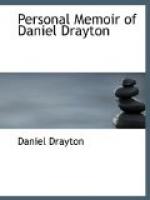the Pearl, and learning from him that business was
dull with him, I proposed the enterprise to him, offering
him one hundred dollars for the charter of his vessel
to Washington and back to Frenchtown where, according
to the arrangement with the friends of the passengers,
they were to be met and carried to Philadelphia.
This was considerably more than the vessel could earn
in any ordinary trip of the like duration, and Sayres
closed with the offer. He fully understood the
nature of the enterprise. By our bargain, I was
to have, as supercargo, the control of the vessel
so far as related to her freight, and was to bring
away from Washington such passengers as I chose to
receive on board; but the control of the vessel in
other respects remained with him. Captain Sayres
engaged in this enterprise merely as a matter of business.
I, too, was to be paid for my time and trouble,—an
offer which the low state of my pecuniary affairs,
and the necessity of supporting my family, did not
allow me to decline. But this was not, by any
means, my sole or principal motive. I undertook
it out of sympathy for the enslaved, and from my desire
to do something to further the cause of universal
liberty. Such being the different ground upon
which Sayres and myself stood, I did not think it
necessary or expedient to communicate to him the names
of the persons with whom the expedition had originated;
and, at my suggestion, those persons abstained from
any direct communication with him, either at Philadelphia
or Washington. Sayres had, as cook and sailor,
on board the Pearl, a young man named Chester English.
He was married, and had a child or two, but was himself
as inexperienced as a child, having never been more
than thirty miles from the place where he was born.
I remonstrated with Sayres against taking this young
man with us. But English, pleased with the idea
of seeing Washington, desired to go; and Sayres, who
had engaged him for the season, did not like to part
with him. He went with us, but was kept in total
ignorance of the real object of the voyage. He
had the idea that we were going to Washington for
a load of ship-timber.
We proceeded down the Delaware, and by the canal into
the Chesapeake, making for the mouth of the Potomac.
As we ascended that river we stopped at a place called
Machudock, where I purchased, by way of cargo and
cover to the voyage, twenty cords of wood; and with
that freight on board we proceeded to Washington,
where we arrived on the evening of Thursday, the 13th
of April, 1848.
As it happened, we found that city in a great state
of excitement on the subject of emancipation, liberty
and the rights of man. A grand torch-light procession
was on foot, in honor of the new French revolution,
the expulsion of Louis-Philippe, and the establishment
of a republic in France. Bonfires were blazing
in the public squares, and a great out-door meeting
was being held in front of the Union newspaper
office, at which very enthusiastic and exciting speeches




